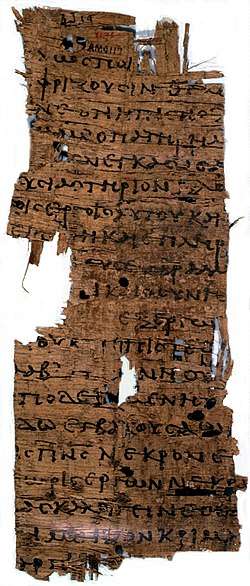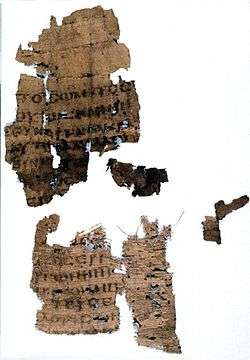James 2
James 2 is the second chapter of the Epistle of James in the New Testament of the Christian Bible. The author identifies himself as "James, a servant of God and of the Lord Jesus Christ" and the epistle is traditionally attributed to James the brother of Jesus, written in Jerusalem between 48–61 CE. Alternatively, some scholars argue that it is a pseudographical work written after 61 CE.[1][2][3] This chapter contains an exposition about the commandment, "You shall love your neighbour as yourself", and about dead faith.[4]
| James 2 | |
|---|---|
 Epistle of James 2:19-3:2 on the recto side of Papyrus 20, from the 3rd century. | |
| Book | Epistle of James |
| Category | General epistles |
| Christian Bible part | New Testament |
| Order in the Christian part | 20 |
Text
The original text was written in Koine Greek.[5] This chapter is divided into 26 verses.
Textual witnesses
Some early manuscripts containing the text of this chapter in Greek are:[6]
- Papyrus 20 (early 3rd century; extant verses 19-26)[7]
- Codex Vaticanus (325-350)[7]
- Codex Sinaiticus (330-360)[7]
- Codex Alexandrinus (400-440)
- Codex Ephraemi Rescriptus (c. 450)
- Papyrus 54 (5th century; extant verses 16-18, 22-26)
An ancient manuscript containing this chapter in the Coptic language is:
No Faith with Favouritism (2:1–4)
Verse 1
- My brethren, do not hold the faith of our Lord Jesus Christ, the Lord of glory, with partiality.[9]
Poor and Rich (2:5–7)
The form of address in verse 5a, Listen, my beloved brethren,[10] is found in James' speech at the Council of Jerusalem (Acts 15:13) and nowhere else in the New Testament.[11] Verse 5b recalls Jesus' blessings in the Sermon on the Mount (Matthew 5:3,5; Luke 6:20) about the poor, in contrast to the rich who 'blaspheme the excellent name that was invoked over you' (verse 7).[11]
Love as the Royal Law (2:8–13)
Verse 8
- If you really fulfil the royal law according to the Scripture, "You shall love your neighbor as yourself", you do well;[12]
Contains citation from Leviticus 19:18. Jesus made "Love your neighbor" a 'foremost command' (Matthew 22:39; Mark 12:31).[13] Because of its pre-eminence and because it is sanctioned by Jesus as the "king", James regards this citation as "the royal law".[13]
Verse 9
- If you show partiality, you commit sin, and are convicted by the law as transgressors.[14]
To act against the poor is like murder, and is judged by the law as such (compare Jeremiah 7:6 and Sirach 34:26).[11]
Verse 11
- For He who said, "Do not commit adultery", also said, "Do not murder". Now if you do not commit adultery, but you do murder, you have become a transgressor of the law.[15]
Contains citation from Exodus 20:13-14; Deuteronomy 5:17-18
Faith and the Needs of the Poor (2:14–17)

Verse 17
- Thus also faith by itself, if it does not have works, is dead.[16]
"Works" without faith are 'dead works', like a lifeless carcass, a body without a soul (James 2:26), and so faith, without works, is a dead faith, because 'good works are second acts', necessarily flowing from the life of faith, and by these, faith appears to be 'living, lively and active', so who perform them appear to be true and living believers.[17]
No Faith without Works (2:18–20)
The theme of this part is that by 'showing' works someone's faith is 'demonstrated' (verse 18b).[11]
The Example of Abraham (2:21–24)
Verse 23
- And the Scripture was fulfilled which says, "Abraham believed God, and it was accounted to him for righteousness." And he was called the friend of God.[18]
Contains citation from Genesis 15:6 cf. 2 Chronicles 20:7; Isaiah 41:8.[19]
- "Accounted": or "credited"[20]
The Example of Rahab (2:25–26)
Verse 25
- Likewise, was not Rahab the harlot also justified by works when she received the messengers and sent them out another way?[21]
"Rahab the harlot": by faith (Hebrews 11:31) received the Israelite spies and protect them in her house and "send them out another way", instead of giving them up to the authority (Joshua 2:1-24).[19] She had faith in the God of Israel (Joshua 2:1-11), but if she did not act on that faith, she would have died when Jericho was destroyed.[19] She experienced God's blessings among the Israelites because she 'activated the faith' she had.[19]
See also
- Abraham
- Faith
- Jesus Christ
- Rahab
- Ten Commandments
- Related Bible parts: Genesis 15, Exodus 20, Leviticus 19, Deuteronomy 5, Joshua 2, 1 Samuel 16, Galatians 5
References
- Riesner 2007, p. 1256.
- Davids, Peter H (1982). I Howard Marshall and W Ward Gasque (ed.). New International Greek Testament Commentary: The Epistle of James (Repr. ed.). Grand Rapids, Mich.: Eerdmans. ISBN 0802823882.
- Evans, Craig A (2005). Craig A Evans (ed.). Bible Knowledge Background Commentary: John, Hebrews-Revelation. Colorado Springs, Colo.: Victor. ISBN 0781442281.
- Riesner 2007, p. 1257.
- 20. James: Introduction, Outline, and Argument. Bible.org
- "The New Testament Virtual Manuscript Room, Institute for New Testament Textual Research (INTF), Münster". Archived from the original on 2015-06-13. Retrieved 2015-06-15.
- Riesner 2007, p. 1255.
- Aland, Kurt; Aland, Barbara (1995). The Text of the New Testament: An Introduction to the Critical Editions and to the Theory and Practice of Modern Textual Criticism. Erroll F. Rhodes (trans.). Grand Rapids: William B. Eerdmans Publishing Company. p. 96. ISBN 978-0-8028-4098-1.
- James 2:1
- James 5:2
- Riesner 2007, p. 1259.
- James 2:8 NKJV
- Hart 2014, p. 1951.
- James 2:9
- James 2:11 NKJV
- James 2:17 NKJV
- John Gill's Exposition of the Entire Bible - James 2:17
- James 2:23 NKJV
- Hart 2014, p. 1952.
- Note [a} on James 2:23 in NKJV
- James 2:25 NKJV
Sources
- Davids, Peter H. (1994). "James". In Carson, D. A.; France, R. T.; Motyer, J. A.; Wenham, G. J. (eds.). New Bible Commentary: 21st Century Edition (4, illustrated, reprint, revised ed.). Inter-Varsity Press. pp. 1354–1368. ISBN 9780851106489.CS1 maint: ref=harv (link)
- Hart, John F. (2014). Rydelnik, Michael; Vanlaningham, Michael (eds.). The Moody Bible Commentary. Moody Publishers. ISBN 9780802490186.CS1 maint: ref=harv (link)
- Riesner, Rainer (2007). "76. James". In Barton, John; Muddiman, John (eds.). The Oxford Bible Commentary (first (paperback) ed.). Oxford University Press. pp. 1255–1263. ISBN 978-0199277186. Retrieved February 6, 2019.CS1 maint: ref=harv (link)
External links
- James 2 King James Bible - Wikisource
- English Translation with Parallel Latin Vulgate
- Online Bible at GospelHall.org (ESV, KJV, Darby, American Standard Version, Bible in Basic English)
- Multiple bible versions at Bible Gateway (NKJV, NIV, NRSV etc.)